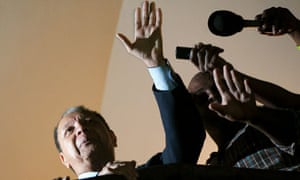
Nor did the French government want him to; it gave him seven days “transit” to find another country in which to see out his days in exile. But nobody wanted the Duvaliers: the US, Switzerland, Spain, Italy, Greece, Morocco, the Seychelles, and even Gabon said no. So “Baby Doc” Duvalier stayed, an illegal immigrant protected by an official omertà as successive French governments turned a blind eye to his presence.
At first, he lived in a style to which he was accustomed: a magnificent chateau outside Paris and a luxury villa on the Côte d’Azur, where the family boasted speed boats and collections of jewels and art. Duvalier would race around the French Riviera in fast cars including a Mercedes, a BMW and a Ferrari Testarossa.
He and his family were profligate spenders. When police raided the Cannes villa, they reported catching Duvalier’s then wife, Michèle, trying to flush a notebook, said to contain details of spending, down the toilet. This spending included more than £100,000 on Givenchy clothes, £170,000 on jewellery, £42,000 for a clock and £6,000 on two Hermès children’s horse saddles.
In 1992, Michèle and Duvalier divorced. The settlement, plus hefty tax bills, were reported to have reduced the former dictator to near penury. At first he moved into a luxurious villa overlooking Cannes, with staff including a chauffeur and a butler. But after he failed to pay the £80,000 owed for annual rent and telephone use, the owner, a former Ivory Coast ambassador to Britain, sued and threw him out.
After running up a huge bill at one hotel, settled by his then girlfriend, he spent five years at the Ritz in Paris as a guest of its owner, Mohamed Al Fayed.
In recent years, journalists tracked Duvalier down to a small, sparsely furnished two-bedroom apartment, far from the chic arrondissements he once frequented. The modest rent, of a few hundred euros a month, was paid by loyal supporters – many of them Haitian taxi drivers and waiters living in France on modest salaries – who continued to prop up Duvalier morally, physically and financially.
At one point he was so desperate he took university classes to improve his “leadership skills” and placed an advertisement seeking work in a local paper. However, critics say he has never seriously sought to earn a living.
Friends described him as lonely and deluded, dreaming of the day he would reclaim power. He began planning for that day a year ago, in the aftermath of the earthquake and the political turmoil that followed.
But there were doubts about his health; he underwent what was described as major surgery at the end of 2009 – details of which have never been given, to avoid suggestions that he is weak – and has had a stroke. Duvalier clearly believes his moment has come. “All I know is politics,” he once said.
Philippe Moreau Defarges, co-director of the French Institute for International Relations, agreed Duvalier’s decision to return to Haiti was probably a mix of “nostalgia and a desire for power”. “He is not an old man and he needs to find a role for himself. He is his father’s son, and he has gone back home.”
• This article was amended on 11 February 2011. The original said that Duvalier spent five years at the Hotel Marriott in Paris. This has been corrected.